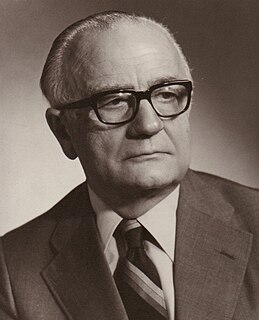
Spyridon Markezinis or Markesinis was a Greek politician, longtime member of the Hellenic Parliament, and briefly the 169th Prime Minister of Greece during the aborted attempt at democratization of the Greek military regime in 1973.

Parliamentary elections were held in Greece on 17 November 1974. They were the first after the end of the Greek military junta of 1967–1974 and took place during the metapolitefsi era. The winner was Konstantinos Karamanlis and his newly formed conservative party, ND. Karamanlis had already formed a government of national unity just after the fall of the dictatorship. The second biggest party was the centrist Center Union - New Forces. Third power in the Parliament became the newly formed PASOK, a radical socialist party led by Andreas Papandreou, son of the former prime minister Georgios Papandreou.

Parliamentary elections were held in Greece on 20 November 1977. After Prime Minister Constantine Karamanlis called for early elections, his New Democracy party suffered a significant loss of power. However, Karamanlis managed to secure an absolute majority in the Parliament. The big surprise was the success of PASOK, whose socialistic rhetoric remained radical. Because of PASOK's success, the Centrists led again by Georgios Mavros lost half of their power. As a result, Andreas Papandreou, PASOK's leader, became a prominent figure in Greek politics. The Communists and the Nationalists managed to amplify their support.

Parliamentary elections were held in Greece on Sunday, 18 October 1981. The Panhellenic Socialist Movement (PASOK), led by Andreas Papandreou, faced New Democracy, led by Georgios Rallis. Papandreou achieved a landslide and PASOK formed the first socialist government in the history of Greece.

Parliamentary elections were held in Greece on 13 June [O.S. 31 May] 1915. The result was a landslide victory for Eleftherios Venizelos and his Liberal Party, winning 187 of the 316 seats in Parliament. Venizelos claimed that his win was proof that the Greek people approved his pro-Allies policy.

Parliamentary elections were held in Greece on 1 November 1920. They were possibly the most crucial elections in the modern history of Greece, influencing not only the few years afterwards, including the country's defeat by Kemal Atatürk's reformed Turkish army in 1922, but setting the stage for Greece's political landscape for most of the rest of the 20th century. It had been nearly five years since the last election, a period during which all democratic procedures were suspended due to the National Schism, when Prime Minister Eleftherios Venizelos announced that the elections would take place on 25 October. However, after the unexpected death of King Alexander, who had assumed the throne after the exile of his father, King Constantine I, the elections were postponed until 1 November.
A referendum on restoring the monarchy was held in Greece on 3 November 1935. The proposal was approved by 97.9% of voters.

A referendum on the return of King Constantine I was held in Greece on 22 November 1920. It followed the death of his son, King Alexander. The proposal was approved by 99.0% of voters. The antivenizelist parties had recently won the elections of 1920. However the referendum is considered illegitimate by modern Greek historians.

Parliamentary elections were held in Greece on 31 March 1946. The result was a victory for the United Alignment of Nationalists, an alliance that included the People's Party, the National Liberal Party, the Reform Party, which won 206 of the 354 seats in Parliament. As a result Konstantinos Tsaldaris became Prime Minister leading a right-wing coalition. Nonetheless, he soon decided to resign in favor of Themistoklis Sophoulis, who led a government of national unity during the entire second phase of the civil war (1946–1949). One of the priorities of the new government was the proclamation of a plebiscite for the restoration of the Greek monarchy.
A referendum on becoming a republic was held in Greece on 13 April 1924. It followed the catastrophic outcome of the Asia Minor Campaign. As a result of the military defeat, King Constantine I was forced to abdicate in favor of his son, King George II. King George himself later went into exile in Romania, the home of his wife, while the government debated the fate of the monarchy. Ultimately, a plebiscite was called. This referendum, following the restoration of Constantine I in 1920, reflected the see-saw nature of the Greek electorate and the then-present dominance of the Liberal and Republican Venizelists in Greek politics and abolished the Crown. Prime Minister Alexandros Papanastasiou favoured the vote for the Republic, while Venizelos kept a neutral stance.

Early parliamentary elections were held in Greece on 5 November 1989. The liberal-conservative New Democracy party of Constantine Mitsotakis emerged as the largest party in Parliament, defeating the Panhellenic Socialist Movement (PASOK) of Andreas Papandreou. However, as in June 1989, Mitsotakis was unable to form a government since his party had failed to win a majority of seats.
In the modern history of Greece, starting from the Greek War of Independence, the Constitution of 1975/1986/2001 is the last in a series of democratically adopted Constitutions.

The history of the Hellenic Republic constitutes three discrete republican periods in the modern history of Greece: from 1822 until 1832; from 1924 until 1935; and from 1974 through to the present. See also the constitutional history of Greece.

Stylianos Gonatas was a Greek military officer and Venizelist politician and Prime Minister of Greece between 1922 and 1924.

A referendum on retaining the republic was held in Greece on 8 December 1974. After the collapse of the military junta that ruled the country from 1967, the issue of the form of government remained unsolved. The Junta had already staged a plebiscite held on 29 July 1973, which resulted in the establishment of the Republic. However, after the fall of the military regime, the new government, under Constantine Karamanlis, decided to hold another one, as Junta legal acts were considered illegal. Constantine II, the former King, was banned by the new government from returning to Greece to campaign in the referendum, but the Karamanlis government allowed him to make a televised address to the nation. The proposal was approved by 69.2% of voters with a turnout of 75.6%.

A constitutional referendum was held in Greece on 29 July 1973. The amendments would abolish the monarchy and establish a republic. The proposal was approved by 78.6% of voters with a turnout of 75.0%. This initiated the first period of the Metapolitefsi.
A constitutional referendum was held in Greece on 15 November 1968. Voters were asked whether they wished to ratify a new constitution prepared by the dictatorial regime. It was approved by 92.1% of voters, with a voter turnout of 77.7%.
The Leonardopoulos–Gargalidis coup attempt was a failed military coup launched on 22 October 1923 in Greece by pro-royalist military officers under the Lieutenant Generals Georgios Leonardopoulos and Panagiotis Gargalidis, and the Colonel Georgios Ziras. Its failure discredited the monarchy and contributed decisively to the establishment of the Second Hellenic Republic in March 1924.
Parliamentary elections were held in Greece on 16 December 1843. The elected body was also tasked with drawing up a constitution, following the 3 September 1843 Revolution. The Three-Party Coalition won almost half the seats in the 243-seat Chamber.
Parliamentary elections were held in Greece between June and August 1844. Supporters of Andreas Metaxas emerged as the largest block in Parliament. However, Ioannis Kolettis became Prime Minister on 18 August.




















